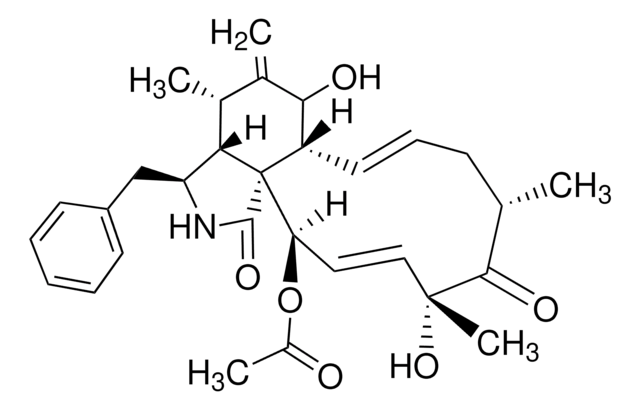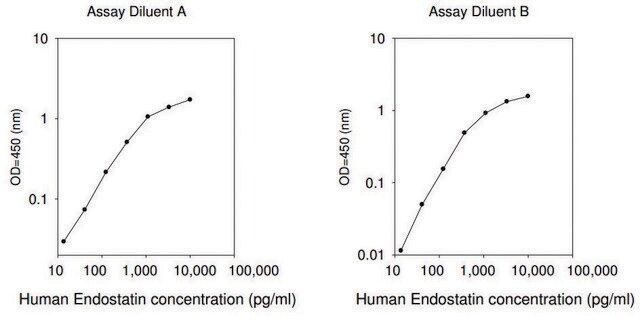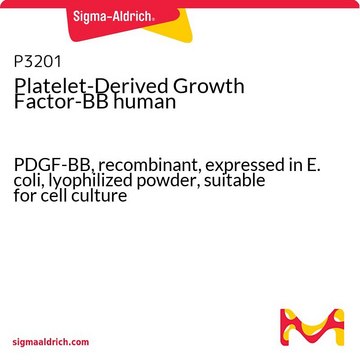SRP3031
Endostatin human
recombinant, expressed in E. coli, ≥98% (SDS-PAGE), ≥98% (HPLC), suitable for cell culture
Synonym(s):
COL18A1
Sign Into View Organizational & Contract Pricing
All Photos(1)
About This Item
UNSPSC Code:
12352200
NACRES:
NA.32
Recommended Products
biological source
human
recombinant
expressed in E. coli
Assay
≥98% (HPLC)
≥98% (SDS-PAGE)
form
lyophilized
mol wt
20.2 kDa
packaging
pkg of 100 μg
technique(s)
cell culture | mammalian: suitable
impurities
<0.1 EU/μg endotoxin, tested
color
white to off-white
UniProt accession no.
shipped in
wet ice
storage temp.
−20°C
Gene Information
human ... COL18A1(80781)
General description
Research area: Cell Signaling
Endostatin is an endogenous glycoprotein derived from the C-terminal portion of the α1 chain of type XVIII collagen. It is encoded by the gene mapped to human chromosome 21q22.3. Recombinant human Endostatin protein consists of 184 amino acid residues. It is expressed in various organs with the highest levels in liver, lung, and kidney.
Endostatin is an endogenous glycoprotein derived from the C-terminal portion of the α1 chain of type XVIII collagen. It is encoded by the gene mapped to human chromosome 21q22.3. Recombinant human Endostatin protein consists of 184 amino acid residues. It is expressed in various organs with the highest levels in liver, lung, and kidney.
Biochem/physiol Actions
Endostatin is a potent inhibitor of angiogenesis. It exerts its angiostatic effect through multiple pathways related to endothelial cell migration and proliferation. Endostatin inhibits and suppresses the actions of matrix metalloproteinases (MMPs), FAK (Focal adhesion kinase)/Ras/p38-MAPK (mitogen-activated protein kinase)/ERK (extracellular signal-regulated kinase) signaling cascade, HIF-1α(hypoxia-inducible factor 1 alpha)/VEGF-A (vascular endothelial growth factor)thereby inhibiting angiogenesis by preventing the migration and invasion of endothelial cells. Endostatin also blocks the apoptosis of cells and the G1 to S phase transition in the cell cycle. Mutations in this gene lead to Knobloch syndrome (KS), a rare autosomal recessive disorder.
Sequence
MHSHRDFQPV LHLVALNSPL SGGMRGIRGA DFQCFQQARA VGLAGTFRAF LSSRLQDLYS IVRRADRAAV PIVNLKDELL FPSWEALFSG SEGPLKPGAR IFSFDGKDVL RHPTWPQKSV WHGSDPNGRR LTESYCETWR TEAPSATGQA SSLLGGRLLG QSAASCHHAY IVLCIENSFM TASK
Physical form
Lyophilized from 10 mM Sodium Phosphate, pH 7.5.
Reconstitution
Centrifuge the vial prior to opening. Reconstitute in water to a concentration of 0.1-1.0 mg/ml. Do not vortex. This solution can be stored at 2-8°C for up to 1 week. For extended storage, it is recommended to further dilute in a buffer containing a carrier protein (example 0.1% BSA) and store in working aliquots at -20°C to -80°C.
Storage Class Code
11 - Combustible Solids
WGK
WGK 3
Flash Point(F)
Not applicable
Flash Point(C)
Not applicable
Choose from one of the most recent versions:
Certificates of Analysis (COA)
Lot/Batch Number
Don't see the Right Version?
If you require a particular version, you can look up a specific certificate by the Lot or Batch number.
Already Own This Product?
Find documentation for the products that you have recently purchased in the Document Library.
A V Digtyar et al.
Biochemistry. Biokhimiia, 72(3), 235-246 (2007-04-24)
Endogenous inhibitors of angiogenesis are proved to be a major factor preventing the emergence of clinically manifested stages of human cancer. The protein endostatin, a 20-kD proteolytic fragment of type XVIII collagen, is one of the most active natural inhibitors
S P Oh et al.
Genomics, 19(3), 494-499 (1994-02-01)
Types XV and XVIII collagen belong to a unique and novel subclass of the collagen superfamily for which we have proposed the name the MULTIPLEXIN family. Members of this class contain polypeptides with multiple triple-helical domains separated and flanked by
Extracellular matrix modulates angiogenesis in physiological and pathological conditions.
Neve A
BioMed Research International, 756078-756078 (2014)
Maria Rita Passos-Bueno et al.
Anais da Academia Brasileira de Ciencias, 78(1), 123-131 (2006-03-15)
Collagen XVIII, a proteoglycan, is a component of basement membranes (BMs). There are three distinct isoforms that differ only by their N-terminal, but with a specific pattern of tissue and developmental expression. Cleavage of its C-terminal produces endostatin, an inhibitor
Ilkka Alahuhta et al.
Experimental cell research, 336(1), 130-140 (2015-06-27)
The turnover of extracellular matrix liberates various cryptic molecules with novel biological activities. Endostatin is an endogenous angiogenesis inhibitor that is derived from the non-collagenous domain of collagen XVIII. Although there are a large number of studies on its anti-tumor
Our team of scientists has experience in all areas of research including Life Science, Material Science, Chemical Synthesis, Chromatography, Analytical and many others.
Contact Technical Service







